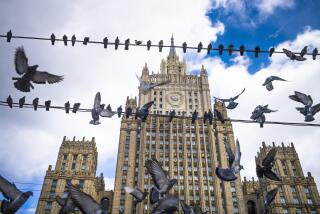Shultz Sees Shevardnadze, Reports ‘Deep Differences’
HELSINKI, Finland — Secretary of State George P. Shultz emerged from talks with new Soviet Foreign Minister Eduard A. Shevardnadze today and said the three-hour session was productive but showed that “very deep differences” persist between the superpowers.
Shultz told reporters after his first private meeting with Shevardnadze that he felt he and the Soviet minister were able to talk easily to each other.
At a separate briefing, Soviet Foreign Ministry spokesman Vladimir Lomeiko said the meeting was “interesting, frank, useful and it should be continued through the diplomatic process.”
Asked About Differences
Reporters asked Shultz what differences he noted between Shevardnadze and his predecessor, Andrei A. Gromyko, who held the post for 27 years. Shevardnadze was named foreign minister July 2 after Gromyko became Soviet president.
“I had a good working relationship with Mr. Gromyko and this is my first meeting with his successor,” Shultz said. “From all indications, we should have an easy ability to talk to each other.”
Shevardnadze, 57, and Shultz, 64, had exchanged greetings Tuesday at the opening of a 35-country meeting here to mark the 10th anniversary of the Helsinki Accords. The conference ends Thursday.
Speaking through an interpreter, Lomeiko said the two men “apart from the important task of stating the positions . . . had to have a certain period of adjustment from a human point of view.”
‘Didn’t Bring Thermometer’
Asked about the meeting’s atmosphere, Lomeiko said, “We did not bring any thermometer. . . . My personal impression is that they have managed to establish the necessary working contact.”
Shultz stressed several times that differences between the United States and Soviet Union emerged in the talks, which lasted the scheduled three hours.
“It has been and remains a fact that while we see some progress in some areas, there are some very deep differences and I believe we will work at them,” Shultz said.
“At the end . . . we asked ourselves what words could be used to describe the talks,” he said. “The words were: interesting, useful, frank, businesslike and productive.”
Planning for November
Both Soviet and American officials said the talks involved the planned November meeting in Geneva between President Reagan and Soviet party leader Mikhail S. Gorbachev.
Soviet officials said it was agreed that the summit would discuss international security, regional conflicts and “bilateral matters.” U.S. officials said at their own briefing that no detailed agenda had been worked out and that Washington wanted to discuss human rights issues with Gorbachev as well.
More to Read
Sign up for Essential California
The most important California stories and recommendations in your inbox every morning.
You may occasionally receive promotional content from the Los Angeles Times.










